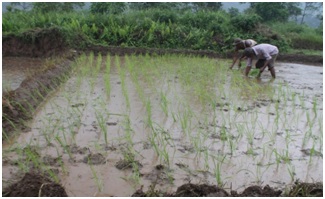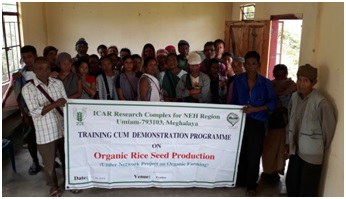Field demonstration on organic farming practices for paddy (var. Shasarang-1) cultivation for improving system sustainability
In the recent years, organic paddy cultivation gained a lot of attention because of its eco-friendly cultivation with sustained maintainance of soil quality and health. Taking positive aspects of organic farming into consideration, one day field demonstration cum awareness programme on “Organic farming practices for paddy cultivation (var. Shasarang-1) for improving system sustainability” was organized by the Division of Crop Production, ICAR Research Complex for NEH Region, Umiam on the 21st June, 2018 at Pynthor village, Ri-Bhoi District, Meghalaya which is adopted under the Network Project on Organic Farming (NPOF) with the major objective of promoting and expansion of area under organic farming, improving grain yield, nutritive value and enhancing farmers income. Altogether 40 farmers from the three villages viz., Pynthor, Mynsain and Umden Umbathiang were attended the field demonstration programme.
During this field demonstration programme, Dr. Jayanta Layek, Scientist (Agronomy) & PI (NPOF), elaborated on actual organic cultivation practices, preparation of different types of rice nursery, nutrient management practices, intercultural practices etc. He stressed the advantage of line sowing of rice (20m x 20m), site selection and adopting high yielding variety which are very crucial for sustainable crop production. Dr. Krishnappa R, Scientist (Crop Physiology) explained the benefits of organic cultivation in terms of maintaining soil and crop health, attainment of quality produce which laverage premium price from market and boost the welfare of tribal farmers without additional investment on agricultural chemicals. He also urged the farmers to incorporate improved production technologies of organic cultivation along with their traditional practices of farming to maintain a ideal balance between higher productivity, ecological health and enhance their income. Dr. Utpal Dey highlighted the importance of seed priming with a formulating mixture containing biocontrol agents such as Trichoderma harzianum+ Pseudomonas fluorescens) @ 10-15 g/kg paddy seed or by immersing the seedlings (20-25 days old) @ 15-20 g/l of water for 15-30 minutes before transplanting to the main puddled field. He described that for proper management of pests in nursery, neem cake @ 3qt/ha and biocontrol agent mixture (4-5 kg/ha mix with well decomposed farm yard manure) should be applied 10-12 days before undertaking sowing. He also explained that application of suspension (2 litre 10-12 days old cow urine, extraction of 2 kg fresh cow dung with 2 kg crushed neem leaves or 2 litre vermiwash in 10 litre of water) will help in controlling rice blast, sucking insect pests and the simple process of frequent drying and flooding practices of the field will prevent the incidence of soilborne pathogens and incidence of devastating false smut. He also explained that for optimum crop growth and for efficient use of nutrients, farmers need to apply recommended doses of fertilizers (10-15 t/ha FYM or 5 t/ha FYM + 5 t/ha vermicompost). Miss Daphibanri Lyngdoh described about the advantages of line sowing of rice which facilitates the sowing of rabi crops such as pea, lentil, mustard etc no-till practice which is key ingredient of conservation agriculture. She also elaborated that if pulses are grown in rice fallows, farmers would be able to receive additional income, better family nutrition as well as witnessing improved soil quality.

